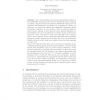Free Online Productivity Tools
i2Speak
i2Symbol
i2OCR
iTex2Img
iWeb2Print
iWeb2Shot
i2Type
iPdf2Split
iPdf2Merge
i2Bopomofo
i2Arabic
i2Style
i2Image
i2PDF
iLatex2Rtf
Sci2ools
119
click to vote
ALT
2006
Springer
2006
Springer
Active Learning in the Non-realizable Case
Most of the existing active learning algorithms are based on the realizability assumption: The learner’s hypothesis class is assumed to contain a target function that perfectly classifies all training and test examples. This assumption can hardly ever be justified in practice. In this paper, we study how relaxing the realizability assumption affects the sample complexity of active learning. First, we extend existing results on query learning to show that any active learning algorithm for the realizable case can be transformed to tolerate random bounded rate class noise. Thus, bounded rate class noise adds little extra complications to active learning, and in particular exponential label complexity savings over passive learning are still possible. However, it is questionable whether this noise model is any more realistic in practice than assuming no noise at all. Our second result shows that if we move to the truly non-realizable model of statistical learning theory, then the label...
Active Learning | Active Learning Algorithm | ALT 2006 | Learning Label Complexity | Machine Learning |
Related Content
| Added | 14 Mar 2010 |
| Updated | 14 Mar 2010 |
| Type | Conference |
| Year | 2006 |
| Where | ALT |
| Authors | Matti Kääriäinen |
Comments (0)

